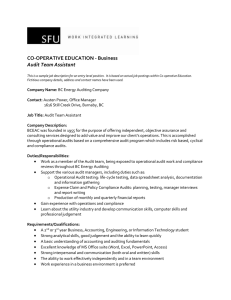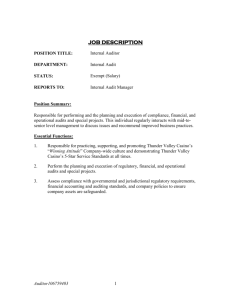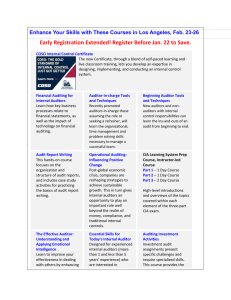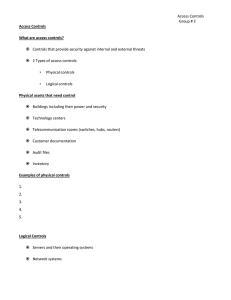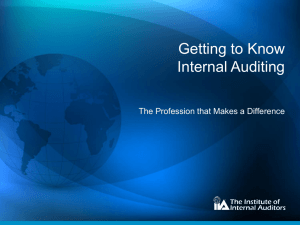Western Illinois University Internal Auditing Department Charter
advertisement
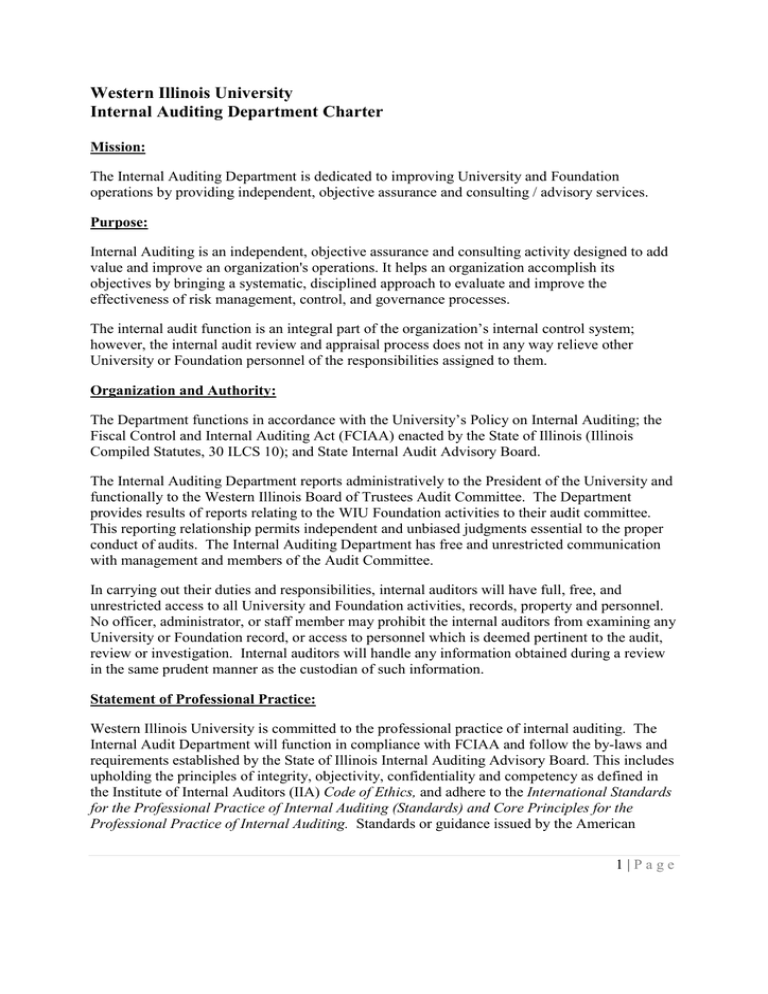
Western Illinois University Internal Auditing Department Charter Mission: The Internal Auditing Department is dedicated to improving University and Foundation operations by providing independent, objective assurance and consulting / advisory services. Purpose: Internal Auditing is an independent, objective assurance and consulting activity designed to add value and improve an organization's operations. It helps an organization accomplish its objectives by bringing a systematic, disciplined approach to evaluate and improve the effectiveness of risk management, control, and governance processes. The internal audit function is an integral part of the organization’s internal control system; however, the internal audit review and appraisal process does not in any way relieve other University or Foundation personnel of the responsibilities assigned to them. Organization and Authority: The Department functions in accordance with the University’s Policy on Internal Auditing; the Fiscal Control and Internal Auditing Act (FCIAA) enacted by the State of Illinois (Illinois Compiled Statutes, 30 ILCS 10); and State Internal Audit Advisory Board. The Internal Auditing Department reports administratively to the President of the University and functionally to the Western Illinois Board of Trustees Audit Committee. The Department provides results of reports relating to the WIU Foundation activities to their audit committee. This reporting relationship permits independent and unbiased judgments essential to the proper conduct of audits. The Internal Auditing Department has free and unrestricted communication with management and members of the Audit Committee. In carrying out their duties and responsibilities, internal auditors will have full, free, and unrestricted access to all University and Foundation activities, records, property and personnel. No officer, administrator, or staff member may prohibit the internal auditors from examining any University or Foundation record, or access to personnel which is deemed pertinent to the audit, review or investigation. Internal auditors will handle any information obtained during a review in the same prudent manner as the custodian of such information. Statement of Professional Practice: Western Illinois University is committed to the professional practice of internal auditing. The Internal Audit Department will function in compliance with FCIAA and follow the by-laws and requirements established by the State of Illinois Internal Auditing Advisory Board. This includes upholding the principles of integrity, objectivity, confidentiality and competency as defined in the Institute of Internal Auditors (IIA) Code of Ethics, and adhere to the International Standards for the Professional Practice of Internal Auditing (Standards) and Core Principles for the Professional Practice of Internal Auditing. Standards or guidance issued by the American 1|Page Western Illinois University Internal Auditing Department Charter Institute of Certified Public Accountants, the General Accounting Office or other governing agencies may also be followed if appropriate. Independence/Objectivity: Internal auditing staff will be independent of the activities that they review. The internal auditor has no direct responsibility or any authority over the activities or operation he/she reviews. Independence requires that the internal auditor carry out work freely and objectively. The internal auditor should not implement accounting procedures, controls or prepare financial records that could compromise the auditor’s independence. Internal auditors may act in a consulting and advisory role without adversely affecting their objectivity. Auditing Objectives: The objective of the Internal Auditing Department is to assist management in the effective discharge of their responsibilities to meet organization goals and objectives. To accomplish this, the Department will furnish management with analyses, recommendations, counsel and pertinent information concerning the activities reviewed or investigated. The attainment of this overall objective involves such activities as: 1. Determining if the overall system of internal control and the controls in each activity under audit are adequate, effective, efficient and functioning. 2. Determining the reliability and adequacy of the accounting, financial, technology and reporting systems and procedures. 3. Ensuring risks are identified and managed. 4. Developing the professional skills and competence of the internal auditing staff. 5. Determining if University and Foundation activities are in conformity with generally accepted accounting principles; policies and procedures; state and federal laws and regulations; contractual obligations and good business practices. 6. Ascertaining the extent to which the organizations assets exist, are properly accounted for and are safeguarded from losses through theft, fraud or other means. 7. Recommending operational improvements. Audit Services: The Internal Auditing Department performs internal operational, technology, compliance and financial related audits of programs, functions, services, departments and accounts under the budget authority of the University or Foundation. There are four primary types of audit services provided: 1. Assurance Services: Assurance Services provide an objective review and examination of evidence for the purpose of providing an independent assessment. The scope and nature of services include review and evaluation of: the achievement of the organization’s strategic objectives; reliability and integrity of financial and operational information; effectiveness and efficiency of operations and programs, including information 2|Page Western Illinois University Internal Auditing Department Charter technology; safeguarding of assets; and compliance with laws, regulations, policies, procedures, and contracts. 2. Consulting Services: Consulting Services are advisory in nature and intended to add value and improve an organization’s governance, risk management, and control processes. Examples include counsel, advice, facilitation, and training. The nature of consulting services will be agreed upon with management. This may also include serving in an advisory capacity on committees. When performing consulting services, Internal Auditing will not assume management’s responsibilities in order to maintain their objectivity and independence. 3. Special Investigations: Investigations evaluate allegations of unethical business practices and/or financial and operational misconduct to determine if allegations are substantiated and to prevent future occurrences. These steps are also taken to prevent additional occurrences from happening. 4. Follow-up Engagements: Follow-up engagements evaluate plans and actions taken to correct reported conditions or deficiencies. Primary Duties and Responsibilities: 1. Prior to June 30th of each year, develop and have approved by the University President and the Board of Trustees Audit Committee Chairperson, a flexible, two-year, risk-based audit plan identifying audits scheduled for the pending fiscal periods. The plan should include risks and control concerns identified by management and address compliance requirements from the FCIAA process. 2. Implement the plan by performing internal operational, compliance, technology and/or financial audits of programs, functions, services, departments and accounts that are under the budget authority of the University and the Foundation. 3. Adjust the plan and address special request audits, reviews or investigations as requested by management or deemed necessary by regulations or risk assessment. 4. Ensure major information systems of internal and accounting administrative controls are reviewed at least once every two years. This includes review of the design of major new information systems and major modifications of those systems before their installation. 5. Report all material results of audits, reviews, or investigations to the appropriate levels of management and the Audit Committee. 6. Prepare an annual report by September 30th, summarizing the scope, results and status of implemented action plans; and the results and activities of the Internal Auditing Department throughout the previous fiscal year. 3|Page Western Illinois University Internal Auditing Department Charter 7. Report annually to the President and the University regarding the accomplishments of the Department, the audit plan, operational activities, budget, and staffing of the Internal Auditing Department. 8. Establish an audit finding follow-up process to monitor and identify if management actions have been effectively implemented, or if senior management has accepted the risk of not taking any action. This includes proper disclosure to the Audit Committee when risks have been accepted. 9. Coordinate with external auditors and regulatory agencies concerning the scope of work to be performed to reduce duplication and optimize audit coverage. 10. Assist management in the coordination of the FCIAA certification of internal controls for the University and Foundation. 11. Assist in the investigation of potentially fraudulent activities and ensure due diligence is performed to identify fraud in planned audits. 12. Periodically communicate and meet with Senior Leadership and Audit Committee to provide results of audits, consulting services, investigations and reviews. 13. On an annual basis, provide the Internal Audit Charter and to Senior Leadership and Audit Committee for review and approval. Approvals: Original Charter Approved by President & BOT: June 1, 2007 Revisions Approved: June, 29, 2010; November 11, 2011; See Below BOT: December 16, 2011; December 14, 2012; December 13, 2013; December 19, 2014; December 18, 2015 President: Nov 1, 2013; November 10, 2014; October 26, 2015 4|Page

